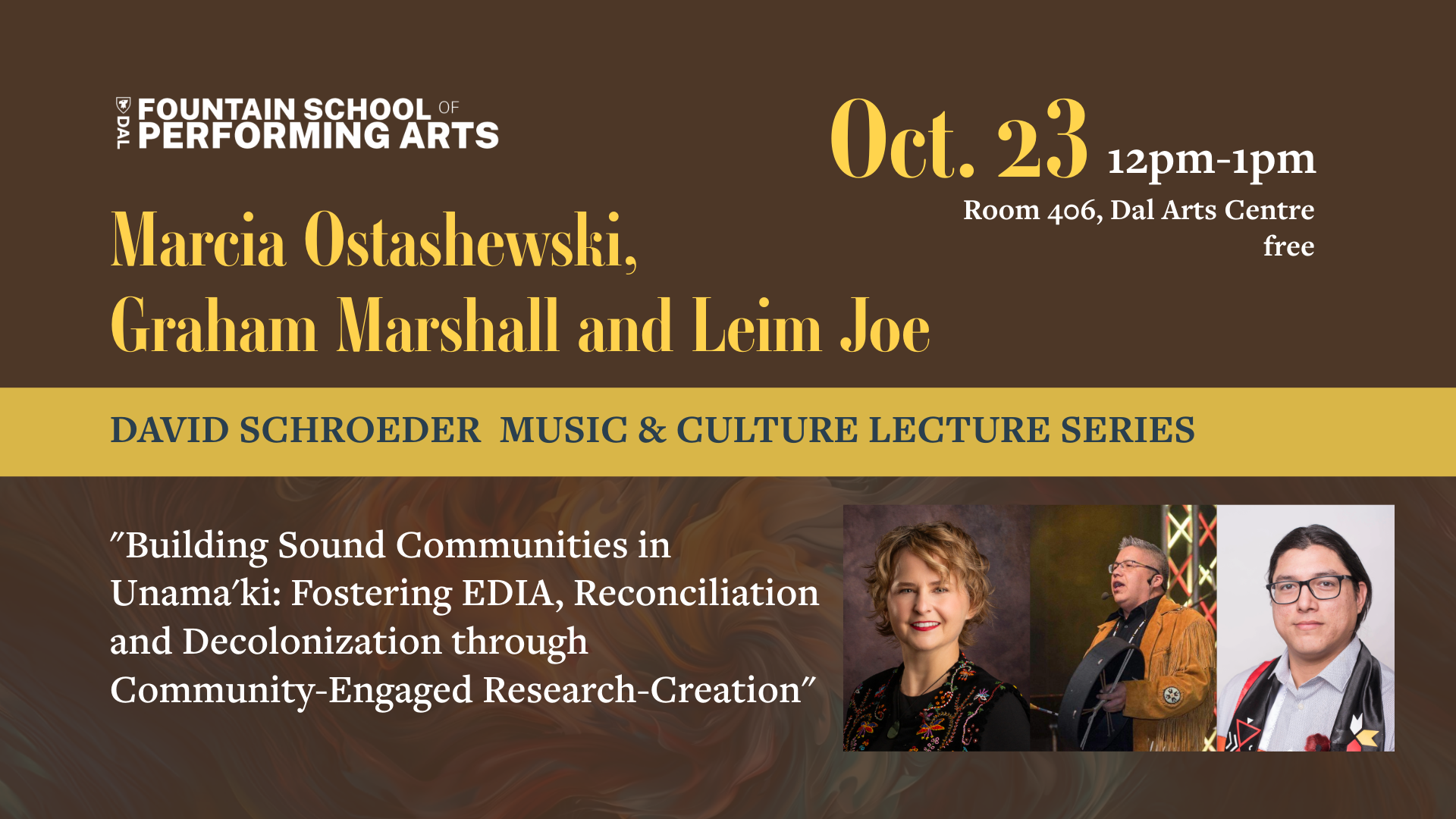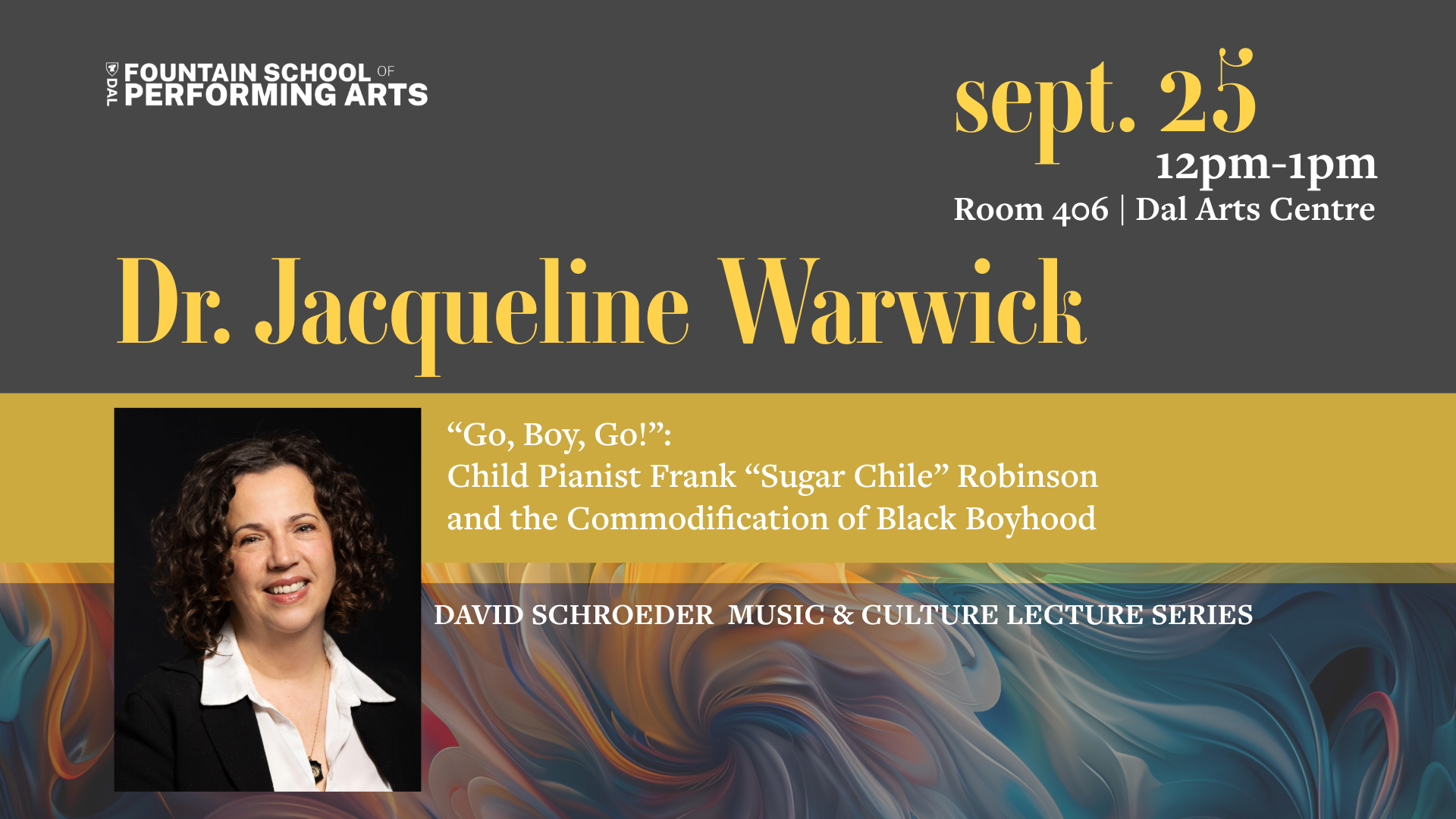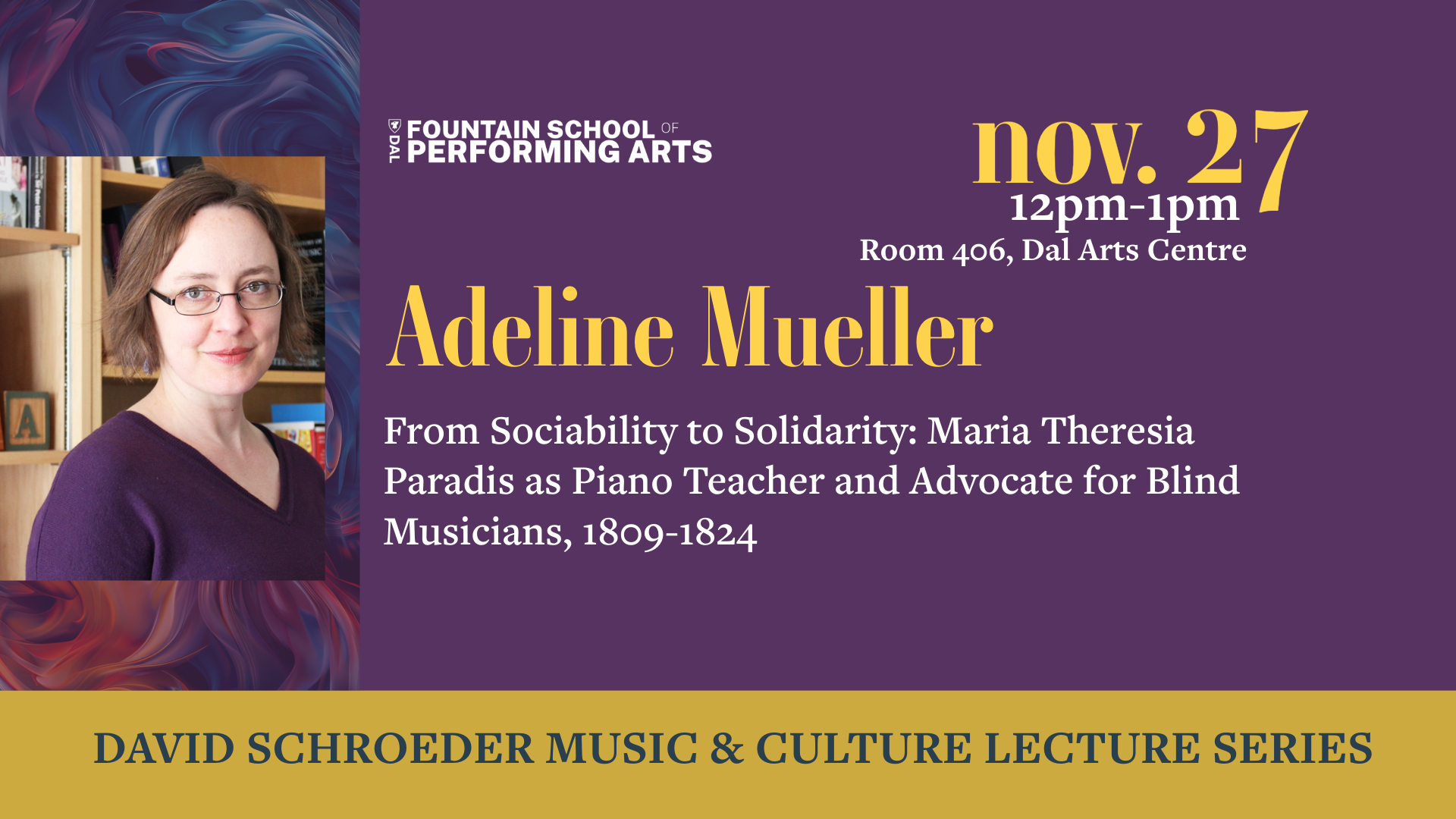David Schroeder Music & Culture Lecture Series
The Fountain School of Performing Arts proudly hosts the David Schroeder Music & Culture lectures. This exciting PUBLIC series features distinguished scholars presenting research on music and culture, drawing on a range of disciplinary approaches and exploring diverse repertories. Join our community’s conversation.
POSTPONED - New Date TBA
From Sociability to Solidarity: Maria Theresia Paradis as Piano Teacher and Advocate for Blind Musicians, 1809-1824
-with Adeline Mueller
Nov. 27 | 12:00PM-1:00PM
Room 406, Dalhousie Arts Centre
free and open to the public
Maria Theresia Paradis (1759-1824) was a renowned blind piano virtuoso who, at the age of 49, opened a small music school for girls out of her home in Vienna. At their public concerts, her students performed challenging music in collaboration with elite musicians, both blind and non-blind, in Paradis’s network. Glowing accounts in the press marveled at both the skill of the players and their affection for one another and their teacher. Paradis’s school thus not only legitimized a blind musician teaching non-blind students; it also staged ensemble music-making as a form of resistance to familiar misconceptions of the blind as isolated and idle. Listening to the music of Paradis and her students—and accounts of their “sisterly love” and “good communal tone”—we can trace a political undercurrent to the sociability that has long been understood to characterize the chamber music of the late Classical and early Romantic periods. Paradis’s school concerts subtly but unmistakably asserted the right of blind musicians to full participation in Viennese society as convivial subjects, rather than sequestered objects of pity and charity.
Adeline Mueller is Associate Professor of Music at Mount Holyoke College. She specializes in opera and art song by Mozart and his contemporaries, particularly in German-speaking Europe, with additional research interests in music and childhood, music and disability, and marginalized composers of the late eighteenth and early nineteenth centuries. Her book Mozart and the Mediation of Childhood was published in 2021 by the University of Chicago Press. She has written articles for Eighteenth-Century Music, Opera Quarterly, and Frontiers in Communication, and contributed chapters to The Cambridge Companion to The Magic Flute (2023), Mozart in Context (Cambridge, 2018), Wagner and Cinema (Indiana, 2010), Mozart and his World (forthcoming), and The Cambridge History of German Opera to the Early Nineteenth Century(forthcoming). In November 2024, she co-organized and hosted an international symposium at Mount Holyoke College entitled “Reframing the Gaze: Maria Theresia Paradis, Blind Musicians, and Musical Culture Before and After Braille.”
 Building Sound Communities in Unama’ki: Fostering EDIA, Reconciliation and Decolonization through Community-Engaged Research-Creation
Building Sound Communities in Unama’ki: Fostering EDIA, Reconciliation and Decolonization through Community-Engaged Research-Creation
-with Marcia Ostashewski, Graham Marshall and Leim Joe
Oct. 23 | 12:00PM-1:00PM
Room 406, Dalhousie Arts Centre
free and open to the public
In this presentation, Marcia Ostashewski, Graham Marshall and Leim Joe share examples of award-winning community-engaged public-facing research, demonstrating ways in which music and arts can be at the core of innovation. Marcia leads and supports interdisciplinary research collaborations, based at the Centre for Sound Communities (Cape Breton U), that bring together partners from across community, university, and industry for lasting, transformational impact. These teams involve people from all over the world, from diverse walks of life. In their work, they bring together experiences and understandings from multiple knowledge systems, and a broad scope of disciplines, professional practices, and communities. Graham, a community-based researcher, and Leim, a university-based research assistant, discuss ways in which Indigenous scholars and practitioners are involved as both leaders and researchers in this work, and speak to the impact of this work for Indigenous communities.
The Centre for Sound Communities team was recognized with a 2024 SSHRC Impact Award in the Connection category, for a project titled for their groundbreaking research, that reflects the focus of this presentation and the broader aim of the team’s research, “Building Sound Communities in Unama’ki: Fostering EDIA, Reconciliation and Decolonization through Community-Engaged Research-Creation.”
Dr. Marcia Ostashewski is a scholar, musician, teacher, administrator, and leader with a decades long career pioneering research through a commitment to relationship building, social justice, anti-racism, reconciliation, and decolonization. Her work is based on an ethics of mutual care and support. She is the Founding Director of the Centre for Sound Communities, where she works with diverse artists, scholars, and traditional knowledge holders to create new knowledge and foster positive change on both an institutional and local level. Dr. Ostashewski’s collaborations connect her with an array of experts and laypeople on several continents and across various sectors with whom she conducts critical scholarly inquiry into music, dance, sound, movement, and their connection to community well-being. This work has been lauded as a model collaborative approach that opens new space to further decolonize institutions and to reimagine the roles of scholars within communities and practices.
Leim Joe graduated from Cape Breton University with a concentration in ethnomusicology in 2024. He is now a student at St. FX University for the Mi’kmaw Kina’matnewey Cohort Bachelor of Education program, a part-time program with a focus on Mi’kmaq educational perspectives and learning. Leim also serves in the Canadian Forces as a reservist with the Cape Breton Highlanders Infantry Unit where he has taught multiple courses, including the Black Bear program, a Basic Military program for Indigenous youth in Atlantic Canada. At home, Leim is a proud father of two children with his wife in Membertou, NS. When not busy with university or work he enjoys spending time with his family, playing one of his musical instruments or walking his dogs.
Graham Marshall comes from Membertou Mi'kmaw Nation, a founding member of the Mi'kmaw drum group Sons of Membertou in 1993. More recently Graham has been performing all over the world sharing songs and telling stories of his culture. Graham has been with Parks Canada as a Heritage Interpreter telling visitors the stories of the Mi'kmaq throughout this land of Mi'kma'ki He is also an Indigenous Liaison for Nova Scotia Indigenous Tourism Enterprise Network creating relationships and partnerships with Mi'kmaw and non-Mi'kmaw organizations.
 ‘Go, Boy, Go!’: Child Pianist Frank "Sugar Chile" Robinson and the Commodification of Black Boyhood
‘Go, Boy, Go!’: Child Pianist Frank "Sugar Chile" Robinson and the Commodification of Black Boyhood
-with Dr. Jacqueline Warwick
Sept. 25 | 12:00PM-1:00PM
Room 406, Dalhousie Arts Centre
free and open to the public
With a focus on Frank Robinson (b. Detroit, 1938), this lecture explores the ways in which child musicians appeal to adult audiences. A Black child prodigy of boogie woogie piano, Robinson was a star in the 1940s, before the activism of Civil Rights leaders like Martin Luther King, and he performed at the White House for President Harry Truman. Robinson was self-taught, and his parents were discouraged from giving him piano lessons; this presentation explores the function of formal music training for child stars. Through study of key performances and compositions, Jacqueline considers what “Sugar Chile” offered to audiences of the time, and how his music is heard today.
Jacqueline Warwick is a musicologist and Dean, Academic, at NSCAD University. She is the author of Girl Groups, Girl Culture: Popular Music and Identity in the 1960s (2007) and Music, Gender, and Sexuality Studies: A Teacher’s Guide (2023). She was Senior Editor for the Grove Dictionary of American Music, 2nd ed. (2013), and co-editor of Musicological Identities: Essays for Susan McClary (2008) and Voicing Girlhood in Popular Music (2016). She has also written on topics ranging from the Beatles, backup singers, the musical Annie, and Michael Jackson. Her current project is Child’s Play: Musical Prodigies and the Performance of Childhood, a book under contract with Oxford University Press.

